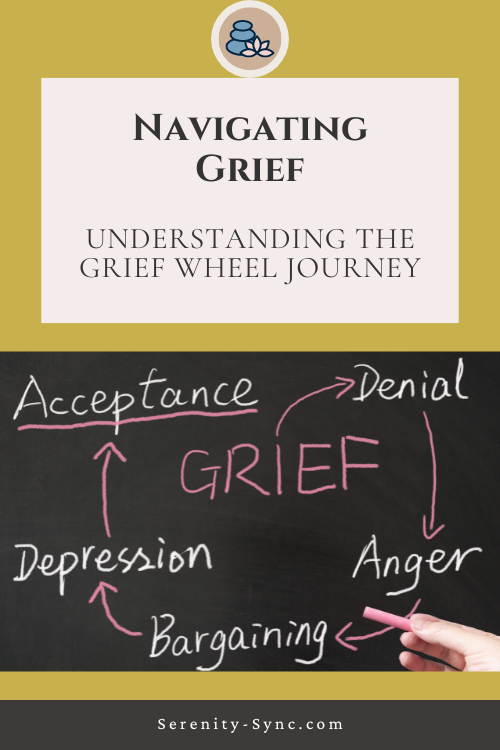In Brief
This blog post delves into the intricate process of grief, exploring the emotional rollercoaster individuals experience when coping with loss. From the impactful stages of denial, anger, bargaining, depression, to eventual acceptance, we navigate through the complexities of grief using the Grief Wheel model. Inspired by the First Nations Medicine Wheel, this holistic approach offers insights into healing by embracing acceptance and understanding. Join us on this journey of emotional discovery and empowerment. We unravel the layers of grief and find solace in the healing process.
Introduction to Grief Wheel
Impact of Grief during Challenging Times
Indeed, grief is a universal human experience that can be particularly challenging during times of loss and upheaval. Whether it’s the loss of a loved one, a job, a relationship, grief impacts individuals in profound ways, affecting their emotional, mental, and physical well-being.
Significance of Understanding the Grief Process
In fact, understanding the grief process is crucial for individuals to navigate their emotions effectively and begin the journey towards healing. By recognizing the stages of grief individuals can better cope with their feelings and ultimately find acceptance and peace.
Stages of Grief
Elisabeth Kübler-Ross’s Five Stages of Grief
Elisabeth Kübler-Ross introduced the five stages of grief: denial, anger, bargaining, depression, and acceptance. These stages are not necessarily experienced in a linear fashion, and individuals may move back and forth between them as they process their emotions.
Non-linear Nature of the Grieving Process
Grief is a complex and non-linear process, with individuals experiencing a range of emotions that can vary in intensity and duration. It’s essential to recognize that there is no right or wrong way to grieve, and everyone copes with loss in their unique way.
The Grief Wheel Model
Hospice Yukon’s Innovative Approach
Indeed, Hospice Yukon’s Grief Wheel model offers a unique and innovative approach to navigating grief. By incorporating elements of the First Nations Medicine Wheel, this model emphasizes the interconnectedness of emotional, physical, and spiritual well-being in the healing journey.
Circular Design Inspired by the First Nations Medicine Wheel
The Grief Wheel’s circular design draws inspiration from the holistic approach of the First Nations Medicine Wheel. This design reflects the cyclical nature of grief and healing, highlighting the importance of balance and harmony in the grieving process.
Emotional Journey through Grief
Exploring Feelings of Sadness, Anger, and Hopelessness
During the grieving process, individuals may experience a myriad of emotions, including profound sadness, anger at the unfairness of the loss, and feelings of hopelessness about the future. It’s essential to acknowledge and express these emotions to begin the healing process.
Importance of Accepting and Integrating Emotions
Acceptance plays a crucial role in the healing journey, allowing individuals to integrate their emotions and experiences into their sense of self. By embracing their feelings and working through them, individuals can gradually find peace and acceptance amidst the pain of loss.
Fun Fact
The Grief Wheel model draws inspiration from the holistic approach of the First Nations Medicine Wheel, emphasizing the interconnectedness of emotional, physical, and spiritual well-being in the healing journey.
Healing and Moving Forward
Embracing Acceptance for Healing
In fact, acceptance is a key component of the healing process after experiencing loss. It involves recognizing and acknowledging the reality of the situation without denying or avoiding it. By accepting the pain and emotions that come with grief, individuals can begin to move forward and work through their feelings.
Integrating Newfound Understanding into Personal Growth
Furthermore, as individuals navigate the grieving process, they gain new insights and perspectives on life and loss. Integrating this newfound understanding into personal growth allows for transformation and resilience. By learning from the experience of grief, individuals can cultivate strength and wisdom that contributes to their personal development.
Cultural Sensitivity in Grief
Recognizing Diverse Cultural Approaches to Grief
Different cultures have unique customs, beliefs, and rituals surrounding grief and loss. It is crucial to recognize and respect these cultural differences when supporting individuals through their grieving process. By understanding diverse cultural approaches to grief, we can provide more effective and compassionate support to those in need.
Importance of Trauma Awareness in the Healing Process
Being trauma-aware in the context of grief means understanding how past experiences and traumas can impact the way individuals process and cope with loss. By recognizing the signs of trauma and its effects on grief, we can offer more comprehensive and sensitive support to those who are struggling to heal.
Conclusion
Summarizing the Importance of the Grief Wheel Model
To conclude, the Grief Wheel model offers a structured framework that guides individuals through the complexities of grief. By providing a roadmap for navigating the emotional turmoil of loss, this model empowers individuals to move through the stages of grief with a sense of direction and purpose.
Encouraging Self-Compassion and Healing in the Face of Grief
Self-compassion is essential in the grieving process, allowing individuals to be kind and understanding towards themselves as they navigate their emotions. By encouraging self-compassion and promoting healing, individuals can find solace and acceptance in the midst of their grief journey.
The Ultimate Guide to Grief: Navigating Loss and Healing
In conclusion, grief is a universal experience that manifests differently across cultures and individuals. By embracing acceptance, integrating newfound understanding, and being culturally sensitive in our approach to grief, we can support one another through the healing process. Remember, the journey through grief is unique to each person, but with self-compassion and a willingness to heal, it is possible to find peace and growth amidst the pain.
Fun Fact
Elisabeth Kübler-Ross’s groundbreaking work on the five stages of grief revolutionized how society views and understands the complex emotional process of coping with loss, sparking conversations on acceptance and healing.

